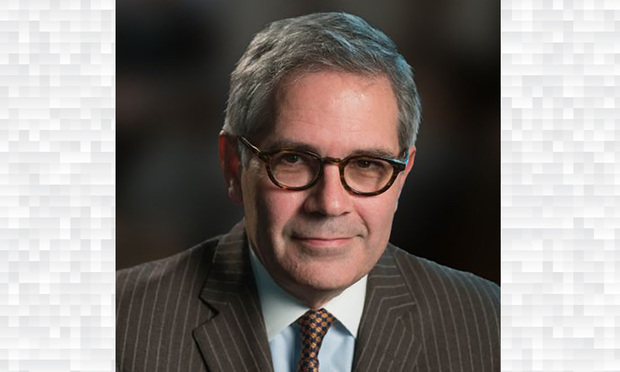Lawyers Question Tactic, Motive Behind Krasner's Bid to Recuse Phila. Judge DiClaudio
Several defense attorneys said they believe a motion filed earlier this week by the Philadelphia District Attorney's Office asking Philadelphia Common Pleas Court Judge Scott DiClaudio to recuse from criminal cases has merit—but that doesn't mean they believe it should have been filed.
April 12, 2019 at 05:13 PM
8 minute read
 Philadelphia District Attorney Larry Krasner.
Philadelphia District Attorney Larry Krasner.
Several defense attorneys said they believe a motion filed earlier this week by the Philadelphia District Attorney's Office asking Philadelphia Court of Common Pleas Judge Scott DiClaudio to recuse from criminal cases has merit—but that doesn't mean they believe it should have been filed.
The April 8 motion, which was first reported by The Philadelphia Inquirer, was filed by District Attorney Larry Krasner, along with Assistant District Attorney John Parron and law division supervisor Nancy Winkelman. The filing said DiClaudio should recuse from hearing criminal cases because his girlfriend, Catherine Smith, currently has a complaint pending with the Pennsylvania Human Relations Commission against the District Attorney's Office, alleging she was fired in February from her position as an assistant district attorney because she's white.
Upon learning of the motion, which was filed in a case captioned Commonwealth v. Gamble, DiClaudio, speaking from the bench Tuesday, told Paul George, assistant supervisor of the law division, that the recusal request showed “vindictiveness on the part of the District Attorney's Office,” according to the Inquirer report. DiClaudio ultimately canceled his entire docket for that day.
On Wednesday, according to the Inquirer, DiClaudio denied the motion and the District Attorney's Office vowed to appeal his decision to the state Superior Court. DiClaudio did say from the bench that any victims, witnesses, defendants or other parties could raise the recusal issue on a case-by-case basis.
“If anyone thinks I cannot be fair,” he said, according to the Inquirer report, ”I will automatically recuse upon request.”
But several criminal defense and ethics lawyers said the decision by Krasner's office to seek DiClaudio's recusal in the first place was curious.
While a recusal motion is often framed by the moving party as a moral or ethical imperative, the truth, practitioners said, is that it's a strategic move attorneys typically employ only when they believe it will benefit their client.
“I don't think it's an ethical duty. It's a tactical decision,” said Steven Fairlie, a criminal defense attorney with Fairlie & Lippy in North Wales.
“Just because you may have a meritorious motion for disqualification, that doesn't mean that you have to file a motion to disqualify,” said Brad Shuttleworth, a criminal defense attorney with Alva & Shuttleworth in Philadelphia.
In this instance, attorneys said, asking DiClaudio to recuse makes little sense from a tactical standpoint, rendering the true motive behind the motion suspect.
For one thing, attorneys said, DiClaudio has a reputation among prosecutors and defense lawyers for being a fair judge.
“If you were to ask any of the [prosecutors] in the trenches—the line assistant district attorneys who actually do work with Scott DiClaudio on a individual basis—not a single one would have brought this motion on their own,” Shuttleworth said. ”This is coming from the administration at the DA's Office. This is coming from people who don't see Scott DiClaudio every single day.”
“It's about Cathy, it's not about Scott,” Shuttleworth continued. “The DA's Office really doesn't have a gripe with him. I know that for a fact.”
Samuel Stretton, a West Chester ethics and criminal defense lawyer who previously represented DiClaudio in an attorney ethics matter and remains friends with him, said he's never heard a complaint about DiClaudio as a judge and that his own experience practicing before him backs that up.
“He doesn't always give me what I want,” Stretton said. “He gives me what he thinks is fair.”
“There was no basis to ask him to recuse himself,” Stretton added. “This was just what I consider a very vindictive motion by Mr. Krasner to punish Judge DiClaudio over the fact that his lady friend has complained about whatever she complained about.”
Fairlie said he has never appeared before DiClaudio but did cross paths with him when DiClaudio was in private practice and “really liked him.”
Fairlie said a typical prosecutor might push to remove a judge from a case who is viewed as being pro-defendant. But Krasner, who is widely regarded as one of the most progressive district attorneys in the country and has garnered his share of criticism from those who believe he is soft on crime, is not a typical prosecutor.
“The reputation of Krasner right now is that he's giving away his cases anyway,” Fairlie said. “What's [DiClaudio] going to do, give away the cases even more? Maybe he wants him to recuse because he's too tough on defendants.”
A spokesperson for the District Attorney's Office said in an emailed statement that whether DiClaudio is viewed as a fair judge by some attorneys who appear before him is irrelevant.
“None of these individual attorneys are appearing before him under litigation brought against them by the judge's domestic partner,” the statement said. “And the recusal doesn't claim general unfairness because that is not the issue or the legal standard. The legal standard is whether a reasonable, objective person who knows the basis for the recusal motion would say it raises an APPEARANCE of partiality. It does.”
Indeed, Krasner's motion asserted that “because of the ongoing dispute between DiClaudio's domestic partner and the office, a reasonable person would question Judge DiClaudio's impartiality in any case in which the office represents a party.”
But both Fairlie and Shuttleworth noted that the public may never have become aware of Smith's HRC complaint, which is confidential, unless Krasner's office had brought it to light in its recusal motion.
“I don't think anybody in the public was questioning [DiClaudio's] impartiality,” Shuttleworth said. “Nobody knew about [the HRC complaint].”
If anything, Shuttleworth said, the District Attorney's Office should have filed the motion under seal and made arrangements for DiClaudio to hold a hearing, “rather than just bag him with it.”
Defendant Aikeam Gamble's attorney, Brian Humble of B. Humble Law in Philadelphia, filed a response opposing the recusal bid, calling it “frivolous.”
“In this case, the commonwealth has not offered any evidence to support recusal other than an alleged relationship with a former assistant district attorney,” Humble said in the filing. “The Supreme Court of Pennsylvania has unequivocally ruled that a relationship with a party is irrelevant, and that the reasonable person standard is subject to the internal review of the court being accused of unfairness.”
Humble's filing also pointed to a footnote in the recusal motion accusing DiClaudio of communicating with multiple District Attorney's Office supervisors during Smith's employment to advocate on her behalf for a promotion. Humble's filing said this “unsubstantiated” allegation ”serves only to slander and cause the same public concern that the commonwealth fails to support in its motion.”
In his statement, however, the District Attorney's Office spokesperson countered that ”the legal question is not whether the general public would have heard of the basis for recusal without the motion. That is completely irrelevant. The only legal question is essentially whether a reasonable, objective person who ALREADY KNOWS the basis for the recusal motion would say it raises an APPEARANCE of partiality.”
“Common sense alone plus every part of our detailed motion confirm that the problem of recusal is not solved just by keeping it quiet,” the statement said. “Covering up or remaining silent are the opposite of transparency and integrity, which are core goals of recusal.”
While Krasner's appearance of impropriety argument may be viewed by some as disingenuous, Fairlie and Shuttleworth both noted that it's not completely baseless. And now that the argument has been made, Fairlie said, DiClaudio's refusal to step away from the case could result in consequences for the judge.
“Even though it's his call [whether to recuse], there's either the appearance of impropriety or there's not,” Fairlie said. If DiClaudio's denial of the recusal motion is appealed and the Superior Court determines that he should have granted the motion, the appeals court “could really make him look bad and then it could even become a disciplinary issue,” according to Fairlie.
Given the “sweeping implications” it could have for the rest of the criminal bench and bar if DiClaudio were forced to recuse and hand off his heavy caseload, Shuttleworth said Krasner's motion brought to mind the old adage “just because you can doesn't mean you should.”
“You read it and it sounds meritorious, possibly,” Shuttleworth said. “But then you think about, 'Are they using their best discretion in actually filing it?' The answer is no.”
Unlike Fairlie and Shuttleworth, however, Humble, reached Friday, said he actually does think the motion is ”totally meritless.”
“Much of the case law and precedent they cited was either out of state or did not represent what they suggested it did,” he said. “I can't imagine a fairer judge in the Criminal Justice Center and it is a mystery to me what the motivation is behind this filing.”
Read More
DA Krasner to Implement New Policies Aimed at Reducing Parole, Probation Times
Federal Judge Denies Krasner's Request to Drop Death Sentence for Double Murderer
Criminal Filings Decreased During Krasner's First Year as District Attorney
This content has been archived. It is available through our partners, LexisNexis® and Bloomberg Law.
To view this content, please continue to their sites.
Not a Lexis Subscriber?
Subscribe Now
Not a Bloomberg Law Subscriber?
Subscribe Now
NOT FOR REPRINT
© 2025 ALM Global, LLC, All Rights Reserved. Request academic re-use from www.copyright.com. All other uses, submit a request to [email protected]. For more information visit Asset & Logo Licensing.
You Might Like
View All

Trump RTO Mandates Won’t Disrupt Big Law Policies—But Client Expectations Might
6 minute read
Kirkland Lands in Phila., but Rate Pressure May Limit the High-Flying Firm's Growth Prospects
5 minute read
Montgomery McCracken Touts 'Record' Financial Performance Despite Shrinking Head Count
6 minute readTrending Stories
- 1Five Years After Vega Much Remains Unsettled in Pay Frequency Litigation
- 2DLA Piper Hires Former FAA Chief Counsel as Transportation Practice Co-Chair
- 3Firms Come Out of the Gate With High-Profile Litigation Hires in 2025
- 4Legal Departments, Firms Expect Gen AI to Boost ALSP Usage
- 5Law Firms Are 'Struggling' With Partner Pay Segmentation, as Top Rainmakers Bring In More Revenue
Who Got The Work
J. Brugh Lower of Gibbons has entered an appearance for industrial equipment supplier Devco Corporation in a pending trademark infringement lawsuit. The suit, accusing the defendant of selling knock-off Graco products, was filed Dec. 18 in New Jersey District Court by Rivkin Radler on behalf of Graco Inc. and Graco Minnesota. The case, assigned to U.S. District Judge Zahid N. Quraishi, is 3:24-cv-11294, Graco Inc. et al v. Devco Corporation.
Who Got The Work
Rebecca Maller-Stein and Kent A. Yalowitz of Arnold & Porter Kaye Scholer have entered their appearances for Hanaco Venture Capital and its executives, Lior Prosor and David Frankel, in a pending securities lawsuit. The action, filed on Dec. 24 in New York Southern District Court by Zell, Aron & Co. on behalf of Goldeneye Advisors, accuses the defendants of negligently and fraudulently managing the plaintiff's $1 million investment. The case, assigned to U.S. District Judge Vernon S. Broderick, is 1:24-cv-09918, Goldeneye Advisors, LLC v. Hanaco Venture Capital, Ltd. et al.
Who Got The Work
Attorneys from A&O Shearman has stepped in as defense counsel for Toronto-Dominion Bank and other defendants in a pending securities class action. The suit, filed Dec. 11 in New York Southern District Court by Bleichmar Fonti & Auld, accuses the defendants of concealing the bank's 'pervasive' deficiencies in regards to its compliance with the Bank Secrecy Act and the quality of its anti-money laundering controls. The case, assigned to U.S. District Judge Arun Subramanian, is 1:24-cv-09445, Gonzalez v. The Toronto-Dominion Bank et al.
Who Got The Work
Crown Castle International, a Pennsylvania company providing shared communications infrastructure, has turned to Luke D. Wolf of Gordon Rees Scully Mansukhani to fend off a pending breach-of-contract lawsuit. The court action, filed Nov. 25 in Michigan Eastern District Court by Hooper Hathaway PC on behalf of The Town Residences LLC, accuses Crown Castle of failing to transfer approximately $30,000 in utility payments from T-Mobile in breach of a roof-top lease and assignment agreement. The case, assigned to U.S. District Judge Susan K. Declercq, is 2:24-cv-13131, The Town Residences LLC v. T-Mobile US, Inc. et al.
Who Got The Work
Wilfred P. Coronato and Daniel M. Schwartz of McCarter & English have stepped in as defense counsel to Electrolux Home Products Inc. in a pending product liability lawsuit. The court action, filed Nov. 26 in New York Eastern District Court by Poulos Lopiccolo PC and Nagel Rice LLP on behalf of David Stern, alleges that the defendant's refrigerators’ drawers and shelving repeatedly break and fall apart within months after purchase. The case, assigned to U.S. District Judge Joan M. Azrack, is 2:24-cv-08204, Stern v. Electrolux Home Products, Inc.
Featured Firms
Law Offices of Gary Martin Hays & Associates, P.C.
(470) 294-1674
Law Offices of Mark E. Salomone
(857) 444-6468
Smith & Hassler
(713) 739-1250





